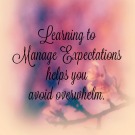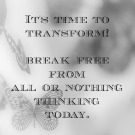Each of us has an internal set of rules about how things should go and what should happen. Much like the rain becomes a river which flows to the sea and then evaporates to become rain again, our internal rules develop as we gain experience and wisdom and become endlessly repeating thought cycles that guide how we live and the choices we make. This means that when things don’t go right or turn out how we’ve planned, we often end up in conflict: conflict with others, conflict with ourselves, and conflict with the realities of our world.
While some of our internal rules keep us safe, others keep us stuck in outdated modes of thinking and prevent us from breaking through to success. We lose our curiosity and close ourselves off from new opportunities, new personal and professional relationships, and then we get frustrated because we can’t figure out where we went wrong.
The great thing about internal rules is that since we made them, we have the power to decide if they still serve us. Using the following three steps, look at how you’ve created your internal rules and throw out the ones that are false expectations masquerading as shoulds and have to’s.
Notice How You’ve Limited Yourself
If you’re frustrated because you can’t accomplish something, look at your goal and ask yourself why and how you’re trying to achieve it. What road have you already mapped out in your mind to reach your destination? Why do you have to take that particular road instead of another? In other words, where have you already limited yourself by placing rules on your journey before you’ve even started?
Society is so obsessed with speed and efficiency that we sometimes forget that something great may be waiting to help us just off the beaten path. Think about how prior experiences are influencing your thoughts about how you have to reach your goal. Experience gained can lead to wisdom, but it can also block off your willingness to try something new.
Write down every rule you’ve made for yourself about how you should or have to accomplish your goal and then write down how you can break each of those rules. See what settles out as fact vs. assumption and come up with three different ways to achieve that goal.
Notice What Rules You’ve Subconsciously Adopted from Others
Our hypercompetitive culture often focuses on game playing and winning vs. collaborating and creating, even when everyone has the same goal. So to play the game like everyone else, you inadvertently adopt their rules whether those rules actually exist or not. What if you didn’t do what others did to accomplish the same goal? Where are you playing along even though you really don’t want to? Remember, you are starting at point A and going to point B but does it really matter what path you personally take to get there? Where are you following when you should be forging your own path?
Again, false assumptions masquerading as shoulds and have to’s can usually be dropped by simply asking a few questions. As with the rules you created for yourself, write down the rules you see others following and notice which ones you’ve adopted. Now, think about how you can break each rule and ask yourself what would happen if you did. Do you need to be a follower or are you burdening yourself with rules that don’t even exist?
Develop New Internal Guidelines
One of the best ways to let go of rigid internal rules is to focus on collaboration. Though you may not always agree with others do or say, collaboration helps you see other points of view and other ways of achieving the same goal. Take back the power you think others have over you by simply asking what they expect of you instead of assuming. Start with what you’re trying to accomplish, wipe the slate clean of rules, and replace them with flexible guidelines that allow you to develop several alternatives that help you accomplish the same thing.
Staying stuck because you’re unwilling to look at the rules you’ve created for yourself is frustrating and discouraging. By breaking your internal rules and replacing them with guidelines, you can achieve your goals and gain valuable experiences all while collaborating and hopefully having a little bit of fun in the process.
How can you look at rule breaking as an opportunity to learn more about yourself, others, and your situation?





